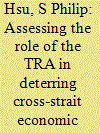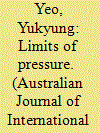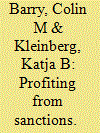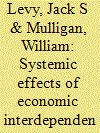| Srl | Item |
| 1 |
ID:
103099


|
|
|
| 2 |
ID:
106126


|
|
|
|
|
| Publication |
2011.
|
| Summary/Abstract |
We address empirically the question of why international economic sanctions are, or are not, chosen as instruments of foreign policy and the question of what determines their success. We hypothesize that cultural linkages between nations are an important factor in explaining both instrument choice and conflict outcomes. Countries that share significant cultural attributes are found to be less likely to apply economic sanctions against one another than countries lacking such cultural ties. However, it is precisely in the case of culturally similar sender and target nations that sanctions are most likely to succeed.
|
|
|
|
|
|
|
|
|
|
|
|
|
|
|
|
| 3 |
ID:
190707


|
|
|
|
|
| Summary/Abstract |
In the context of economic interdependence, South Korea, like other countries with asymmetrical trade relations with China, is often seen by its citizens as vulnerable to China’s use of economic power to gain political influence. However, South Korea’s deployment of the THAAD (Terminal High Altitude Area Defense) offers the opposite perspective on South Korea’s vulnerability. Despite China’s coercive policies against South Korean businesses and great leverage over Korea’s economy, China failed to generate a concession regarding Korea’s decision to deploy the THAAD. The question is why? Drawing on the 2016–17 THAAD crisis between South Korea and China, I argue that influence of coercive power will depend on the coercive state’s willingness to pay a cost, the target state’s level of stateness, and the relative intensity of interests related to the policy. This case study helps us understand the circumstances under which China’s use of economic coercion against target countries may be successful.
|
|
|
|
|
|
|
|
|
|
|
|
|
|
|
|
| 4 |
ID:
103096


|
|
|
| 5 |
ID:
160574


|
|
|
|
|
| Summary/Abstract |
Countries use economic sanctions as a way to force their opponents to make policy concessions. Such external pressure may, as the designers of sanctions often intend, affect the degree of domestic support for the target's political leaders. It may even threaten the leaders’ survival in office. We investigate how these dual pressures—preference for policy concessions and concern about target leaders’ political future—shape the use of sanctions in the context of political relations between the sanctioning and sanctioned countries. The political relations between the two countries matter because a decline in the likelihood of the target leader's political survival results in a cost for the sanctioner when the target is a friendly regime and generates a benefit when the targeted regime is an adversary. Therefore, we argue, and show statistically, that economic coercion is more likely for friendly governments when they are politically stable and unfriendly governments when they are politically vulnerable. We illustrate our causal mechanism using declassified primary sources for two case studies of US sanctions against Chile.
|
|
|
|
|
|
|
|
|
|
|
|
|
|
|
|
| 6 |
ID:
146144


|
|
|
|
|
| Summary/Abstract |
Scholarship on the determinants of foreign direct investment (FDI) flows has produced valuable insights into the role of host state characteristics and home-host relations. This study draws attention to another factor in investment decisions—the political and economic relations that home and host states maintain with third-party states. More narrowly, we focus on how investors respond to their home-state's imposition of economic sanctions against a trading partner. Greater economic integration has allowed states to use economic sanctions more frequently in recent decades. At the same time, economic sanctions are thought to have a distorting effect on global trade and financial flows as firms and governments adjust to new constraints. We argue that as firms at home in the sanctioning state respond to coercive measures against a trading partner by looking for alternative sources of profit, they will shift investments to states that can provide indirect access to the sanctioned economy. In particular, those states that are perceived as prospective sanctions-busters—major trading partners of the sanctions target or states with a history of sanctions-busting behavior—will benefit disproportionately from the misfortune of others. We test this conjecture using data on US economic sanctions and global flows of US FDI from 1966 to 2000. The findings reveal that investor decision making in part responds to political developments beyond the home-host dyad.
|
|
|
|
|
|
|
|
|
|
|
|
|
|
|
|
| 7 |
ID:
095379


|
|
|
|
|
| Publication |
2010.
|
| Summary/Abstract |
The crisis bargaining literature sees demands as endogenous to crises. However, despite the parallels between military and economic coercion, sanctions researchers have preferred to analyze economic coercion after demands have been issued, and have not explored sufficiently the possibility that when senders formulate their policy objectives, they consider the international constraints imposed by the capabilities and interests of target states. I complement the sanctions literature by deriving the implications of strategic goal formulation in a game theoretic model of economic coercion that assumes endogenous demands. The model explains the inconsistent empirical relationship between sanctions costs and outcomes as well as the paradoxical tendency of senders to select into difficult disputes. I find that threats are not always more effective than sanctions and suggest what an optimal sanctions policy might look like.
|
|
|
|
|
|
|
|
|
|
|
|
|
|
|
|
| 8 |
ID:
193172


|
|
|
|
|
| Summary/Abstract |
Empirical research generally supports the dyadic-level trade-promotes-peace hypothesis, while demonstrating that the relationship is weaker, more complex, and more conditional than liberal theory suggests. We shift to the system level and examine a neglected path to conflict in economically interdependent systems. In the great power competition for support among smaller states, a great power at a competitive disadvantage in economic instruments of influence may be incentivised to adopt more militarised strategies. We illustrate our argument with case studies of Austro-Hungarian and Russian influence strategies before the First World War and of Prussian strategies among German states before the Franco-Prussian War.
|
|
|
|
|
|
|
|
|
|
|
|
|
|
|
|
| 9 |
ID:
182249


|
|
|
|
|
| Summary/Abstract |
In theory, superpowers should possess a range of foreign policy
tools: military might, cultural cachet, diplomatic persuasion,
technological prowess, economic aid, and so on. But to anyone
paying attention to U.S. foreign policy for the past decade, it has
become obvious that the United States relies on one tool above all:
economic sanctions.
|
|
|
|
|
|
|
|
|
|
|
|
|
|
|
|